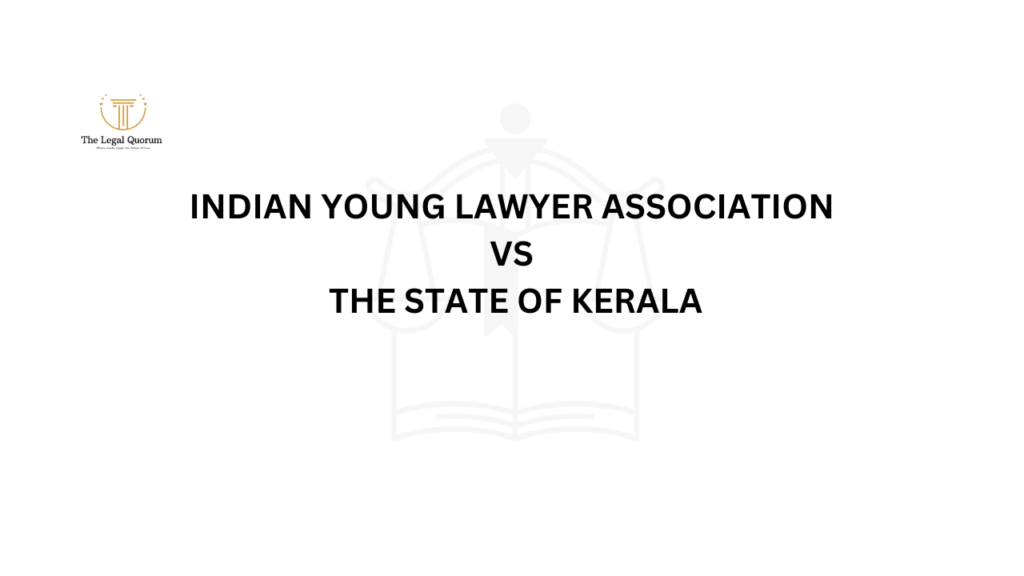Published On: 10 October, 2023
Shreya Singhal v. Union of India
INTRODUCTION
All people are given the right to express their views and in India, it is given in the constitution the right to express under Article 19(1)(a), but there are certain restrictions given under Article 19 (2) there are certain limitations that until the thing comes about state integrity or dignity. This case is about Section 66A of the Information Technology Act, 2000 which talks about anybody who posts something wrong, that is offensive about permission through online mode, this provision applies to those who say false about someone. Whoever claims this information will be punished and a fine will be charged to them.
Supreme Court declared Section 66A unconstitutional as somehow it was violating the fundamental rights of the individuals, but still, police were misusing this and they were charging people under this Section even though this section was scrapped. Section 66A was added in 2009 after the amendment so that there could be control over the nuisance that is created online, who posts false news about someone. This section was accepted but there were certain defects under that there was no clear-cut meaning of the words given under this section such as ‘annoyance’, and ‘insult’ etc., there was one word under this section ‘ inconvenience’ that could be which is not convenient for us but for another party, it could be convenient to them so this was the reason that somewhere and somehow there was a violation of freedom of speech and expression.
FACTS OF THE CASE
Police arrested two women, Shaheen, and Rinu as they posted on Facebook about the closure of Mumbai due to the death of a political leader, they talked about the closing of Mumbai doesn’t make sense, people should be living freely as they wanted to live, so police charged these girls under Section 66A, which was about to make liable those who post offensive things through the use of online mode. Thus, these girls posted this on their account they were using their fundamental right which was the right to speech and expression, when these girls were arrested writ was filed under Article 32 also one recommendation was given by the union government that if any person who is arrested under Section 66A of IT act, so they will need permission from the superior officer who Is not below the rank of inspector general of police.
There was a lot of news regarding Section 66A as police were misusing this section, there were lots of petitions against this section so the Supreme Court gave judgment only in this case, SC declared Section 66A, 69A, and 79 of the IT Act unconstitutional as they were violating Article 14, 19(1)(a), 21 of Indian constitution, which were right equality, right to freedom, speech and expression and right to life. To criticize the government is also a part of the right to express our thoughts the people can express whatever think but till certain restrictions they can, the citizen is given full right to choose their government which is the concept of democracy so there is nothing wrong on the part of these girls, right to life was also infringed as the people who are not given freedom to speech and expression so what will be the benefit of freedom of life, there was inequality as the law was dealing unequal with other people so supreme court declared these all sections unconstitutional. After the hearing court released these two girls as the case was in favor of them, there was nothing wrong on the side of both of the girls.
ISSUES RAISED
- Whether Sections 66A, 69A, and 79 of the IT Act were violating the rights of the people?
- Whether the two girls wrote offensive things about the political leader, was that valid or not?
JUDGMENT
A division bench ruled out that Section 66A is unconstitutional as it violates the right to life, right to speech and expression, and right to equality, which is given under Article 14, 19(1)(a), 21. If our fundamental right is violated we can file a direct writ to the Supreme Court and so here Supreme Court declared Section 66A invalid as there was no complete definition given. Though there is a prohibition under Article 19(2) as the individuals can not speak against the state under this case the government cannot restrict someone to deprive their right to express and speech as there was nothing wrong by the side of those girls. The court said that the language was invalid as here one person can find certain things offensive and another person cannot find them offensive so there was no clear-cut definition about these so the law cannot make liable to someone if there is confusion in the given section.
The court also talked about 69A which talks about blocking certain information from social media where the government can do it and here court agreed that this was acceptable but they can’t limit the rights of someone. Justice Nariman also clarified that if we are restricting someone from the right to express their opinion we should keep such things in mind that if they are saying something that is against the state or public we can restrict but if someone is expressing their own opinion or thought so that is an infringement of their right so the court said that there is a violation of their right and they didn’t say something which was against public or state.
The main criticism against this Section was that there was no clear definition of the word offensive if someone is talking offensively about someone the person who is talking about it may feel that this is normal but another available person there can find it uncomfortable or offensive so there was much more confusion and also there were many things about this section which were of lots of confusion, some petitioners also argued that there were lots of interpretation of laws which was whimsical and which could lead arrest arbitrary, police can misuse this without any reason.
ANALYSIS
The case Shreya Singhal v. Union of India is the first landmark case where the Supreme Court declared the law as censorship which was passed by the parliament and declared the law illegitimate, this decision gave the right to express whatever we think and also restricted the government that not to restrict someone’s right. Justice Nariman stated that the section prohibiting the right to speech and expression should be relatable to Article 19(2). Under this case Section 66A failed against the two tests, The first test was whether what people said on the internet posed an immediate and clear danger to society. The court found that in most cases, the things people said online didn’t create such a danger to society, The second test was whether what people said could make others hate each other or cause problems in society. The court found that the posts for which people were arrested didn’t make people hate each other or cause chaos in society. Because Section 66A failed these tests and was being misused to restrict free speech, the court decided that this law was not justified. This decision became a significant example of protecting the right to free speech in India.
There should be a balance between the freedom of speech and the statements that are hostile to someone, although it is difficult to balance this as enforcement can be influenced by political dynamics rather than following the law impartially. Freedom of speech is our fundamental right but it’s not absolute there are restrictions given for example, we cannot speak about something that is related to national security or if we are defaming someone we cannot harm someone’s reputation so in this case limitation is provided. In the case Romesh Thappar v. State of Madras, it was stated that freedom of speech is vital for individual liberty and democratic societies. The right balance between letting people speak freely and stopping speech that can cause harm or violence is really hard. Courts and lawmakers often struggle with this because they want to protect everyone’s right to express themselves, but they also want to keep society safe from harmful or violent actions that might be encouraged by certain kinds of speech. It’s like walking a tightrope, trying to be fair to everyone while keeping everyone safe.
Certainly, there are two main defects in Section 66A first is that there is no properly specified definition given another defect is that the term offensive, etc does not specify what exactly it is. This section limited the right to express as this section only punished those in this section where no clear-cut definition is given so this is the reason that the Supreme Court declared this section unconstitutional.
CONCLUSION
Supreme Court declared Section 66A unconstitutional as it was being misused by the police officer, we know that our country is a democratic country and hence freedom of speech and expression is our fundamental right, and violating this could impact all the citizens which are very unfavorable for all of us, we cannot make our country just like North Korea as there the people are restricted to not to express whatever they think. Though there are some limitations given in our constitution regarding our speech which is related to defamation and sedition completely restricting the people from their speech and expression is not good for all the citizens. In this case, the girls expressed right that shutting down Mumbai doesn’t make sense due to the death of any particular leader though that leader was very great and powerful we cannot stop the people from doing any work. The girls were right from their side as a citizen of India we can express what we think and no one can deprive their rights. If the people are restricted from this democracy will not prevail in our country, though the court gave a decision in favor of these girls and upheld Section 66A unconstitutional.
REFERENCES
https://www.legalservicesindia.com/article/2473/Shreya-Singhal-v-U.O.I.html




